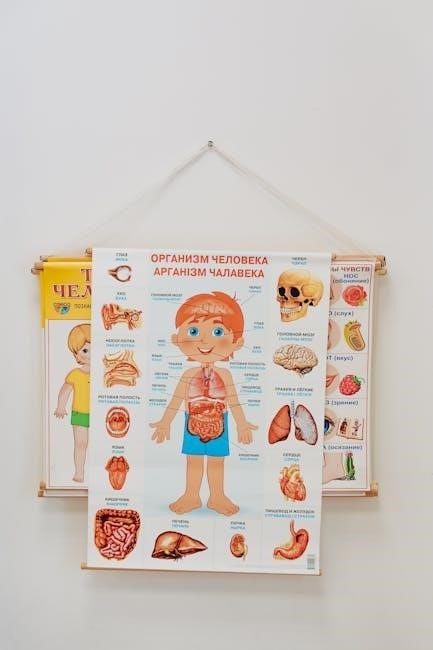This guide provides a comprehensive, portable resource for aspiring Certified Medication Aides (CMAs)․ It covers essential topics, practice questions, and strategies to master medication administration and exam preparation effectively․
The Role of Certified Medication Aides (CMAs) in Healthcare
Certified Medication Aides (CMAs) play a crucial role in healthcare by assisting licensed nurses with medication administration․ Their primary responsibility is to ensure medications are administered accurately and safely, adhering to prescribed schedules and medical protocols․ CMAs also supervise patients who self-administer medications, observe for adverse reactions, and report any significant changes to healthcare providers․ Effective communication is essential, as CMAs must interact with patients, families, and healthcare teams to provide clear instructions and address concerns․ They work under the supervision of licensed nurses, ensuring compliance with legal and ethical standards․ CMAs are indispensable in long-term care facilities, hospitals, and clinics, contributing to patient well-being and maintaining high standards of care․ Their role requires attention to detail, empathy, and a commitment to patient safety․
Why a Printable Study Guide is Essential for CMA Preparation
A printable study guide is a vital resource for CMA candidates, offering a portable and accessible way to prepare for certification․ It provides structured content, including practice questions, flashcards, and detailed explanations, to help candidates master key topics like medication administration and legal standards․ The guide’s offline availability ensures uninterrupted learning, while its concise format allows for easy review and organization․ By incorporating interactive elements and real-world scenarios, the guide enhances understanding and retention․ Additionally, it serves as a reliable reference for reinforcing concepts learned in workshops or online courses․ With a printable guide, candidates can create a personalized study plan, track progress, and build confidence for exam success․

Core Competencies for Medication Aides
Medication aides must master accurate administration, legal compliance, patient safety, and clear communication․ These competencies ensure effective medication management and adherence to healthcare standards․
Safe Medication Administration Practices
Safe medication administration is a critical competency for CMAs․ It involves verifying the five rights: right patient, drug, dose, time, and route․ Proper documentation and adherence to facility policies are essential․ CMAs must ensure medications are administered as prescribed, observing for side effects and reporting concerns․ Understanding drug interactions and contraindications is vital to prevent harm․ Regular training and updates on new medications are recommended to maintain safety standards․ Following proper hand hygiene and using personal protective equipment when necessary are also key practices․ CMAs should always double-check medications before administration and communicate effectively with the healthcare team to ensure patient safety․ These practices minimize errors and promote positive health outcomes․
Understanding Drug Classification and Uses
Understanding drug classification and uses is fundamental for CMAs to administer medications safely․ Drugs are categorized by therapeutic effects, such as anticoagulants for blood thinning or antidiabetics for managing blood sugar․ CMAs must recognize classifications like analgesics, antibiotics, and antihypertensives to predict drug interactions and side effects․ This knowledge helps in verifying prescriptions and educating patients about proper usage․ The study guide includes detailed charts and summaries to aid in mastering drug classifications․ By learning drug uses and potential adverse reactions, CMAs can ensure accurate administration and patient safety․ This section emphasizes the importance of staying updated on new medications and their classifications to provide high-quality care․

Legal and Ethical Considerations
CMAs must adhere to legal and ethical standards, ensuring patient rights, confidentiality, and compliance with medication administration laws․ This section emphasizes the importance of professional integrity and accountability in healthcare settings․
Regulations Governing Medication Administration
Medication administration is strictly regulated to ensure safety and accountability․ Certified Medication Aides (CMAs) must follow state-specific laws, facility policies, and nursing oversight requirements․ Proper documentation of medication administration is mandatory, including accurate recording in patient charts and nurses’ notes․ CMAs must also undergo regular reviews by registered nurses to ensure compliance․ These regulations vary by state, such as North Carolina’s specific rules for adult care homes․ Understanding these guidelines is critical for CMAs to avoid legal issues and ensure patient safety․ Adherence to these standards helps maintain professionalism and accountability in healthcare settings․
Patient Rights and Confidentiality in Medication Management
Respecting patient rights and confidentiality is fundamental in medication management․ Patients have the right to informed consent, privacy, and refusal of treatment․ CMAs must ensure medications are administered ethically and respectfully, adhering to legal standards like HIPAA․ Confidentiality requires safeguarding patient health information, sharing only with authorized personnel․ Understanding these principles is vital for building trust and ensuring compliance with healthcare regulations․ Proper documentation and clear communication also support patient autonomy and dignity, fostering a respectful care environment․ CMAs play a key role in upholding these standards, ensuring patient rights are protected throughout the medication process․ This ethical approach enhances patient care quality and accountability in healthcare settings․

Preparing for the CMA Certification Exam
Thorough preparation is essential for success․ Utilize this guide’s practice tests, review strategies, and focus on understanding exam formats to build confidence and competence for the certification․
Test-Taking Strategies and Exam Format
Understanding the exam format is crucial for success․ The CMA certification exam typically includes multiple-choice questions that assess knowledge of medication administration, legal standards, and patient care․ Time management is key, as candidates must answer all questions within the allotted time․ Effective strategies include prioritizing questions based on confidence, eliminating incorrect answers, and using process-of-elimination techniques․ Practice tests are invaluable for familiarizing oneself with the format and improving speed․ Additionally, reviewing errors post-exam simulation helps identify weak areas for focused study․ Staying calm and systematic during the test enhances performance․ This guide offers tailored tips and practice questions to help candidates master these strategies and excel in the exam․ Proper preparation ensures confidence and competence on test day․
Practice Questions and Interactive Study Tools
Engaging with practice questions and interactive study tools is essential for effective preparation․ This guide includes multiple-choice questions, flashcards, and scenario-based exercises to simulate real-world challenges․ By practicing with these resources, candidates can identify knowledge gaps and strengthen their understanding of key concepts․ Interactive modules, such as dosage calculation drills and medication classification quizzes, further enhance learning․ Detailed explanations for each question provide clarity and reinforce retention․ Utilizing these tools regularly helps build confidence and familiarity with the exam format․ Additionally, tracking progress through interactive tools allows learners to focus on areas needing improvement․ These resources are designed to complement traditional studying, ensuring a well-rounded and dynamic approach to CMA exam preparation․

Additional Resources for Success
Supplement your study with workshops, online courses, and downloadable PDF guides․ Utilize flashcards, expert forums, and interactive tools to enhance your learning experience and retention of key concepts effectively․
Recommended Study Materials and Workshops
To excel in your CMA preparation, consider leveraging a variety of study materials and workshops․ Textbooks like the CMA Exam Prep Guide 2024-2025 offer comprehensive insights and practice tests․ Online platforms provide interactive tools, such as flashcards and multiple-choice questions, to reinforce learning․ Workshops on medication administration, hosted by healthcare organizations, are invaluable for hands-on training․ Additionally, downloadable PDF guides and expert-led webinars can enhance your understanding of drug classifications and legal considerations․ Utilize these resources alongside the printable study guide to create a well-rounded study plan․ Combining structured learning with practical exercises will ensure you are fully prepared for the certification exam and your future role as a medication aide․
Next Steps After Completing the Study Guide
After finishing the printable medication aide study guide, the next steps involve practical application and exam preparation․ Schedule practice exams to assess your readiness and identify areas for improvement․ Attend review sessions or workshops to clarify doubts and gain hands-on experience․ Seek feedback from instructors or experienced CMAs to refine your skills․ Apply for the certification exam through your state’s nursing board, ensuring all documents, like confirmation letters, are in order․ Stay updated on medication administration guidelines and join study groups for peer support․ Finally, remain confident and focused as you approach the exam, knowing you’ve equipped yourself with the necessary knowledge and strategies for success․
